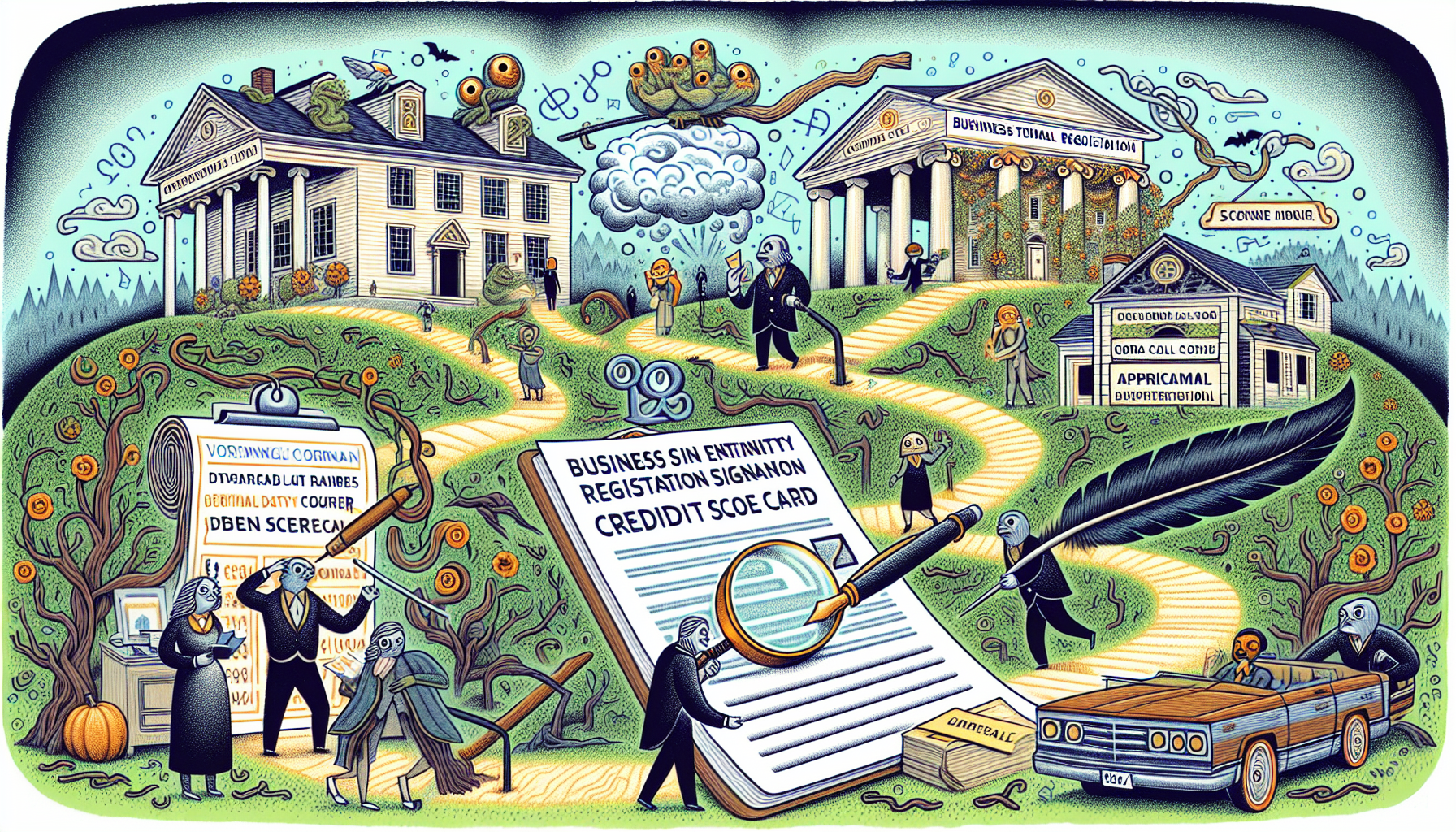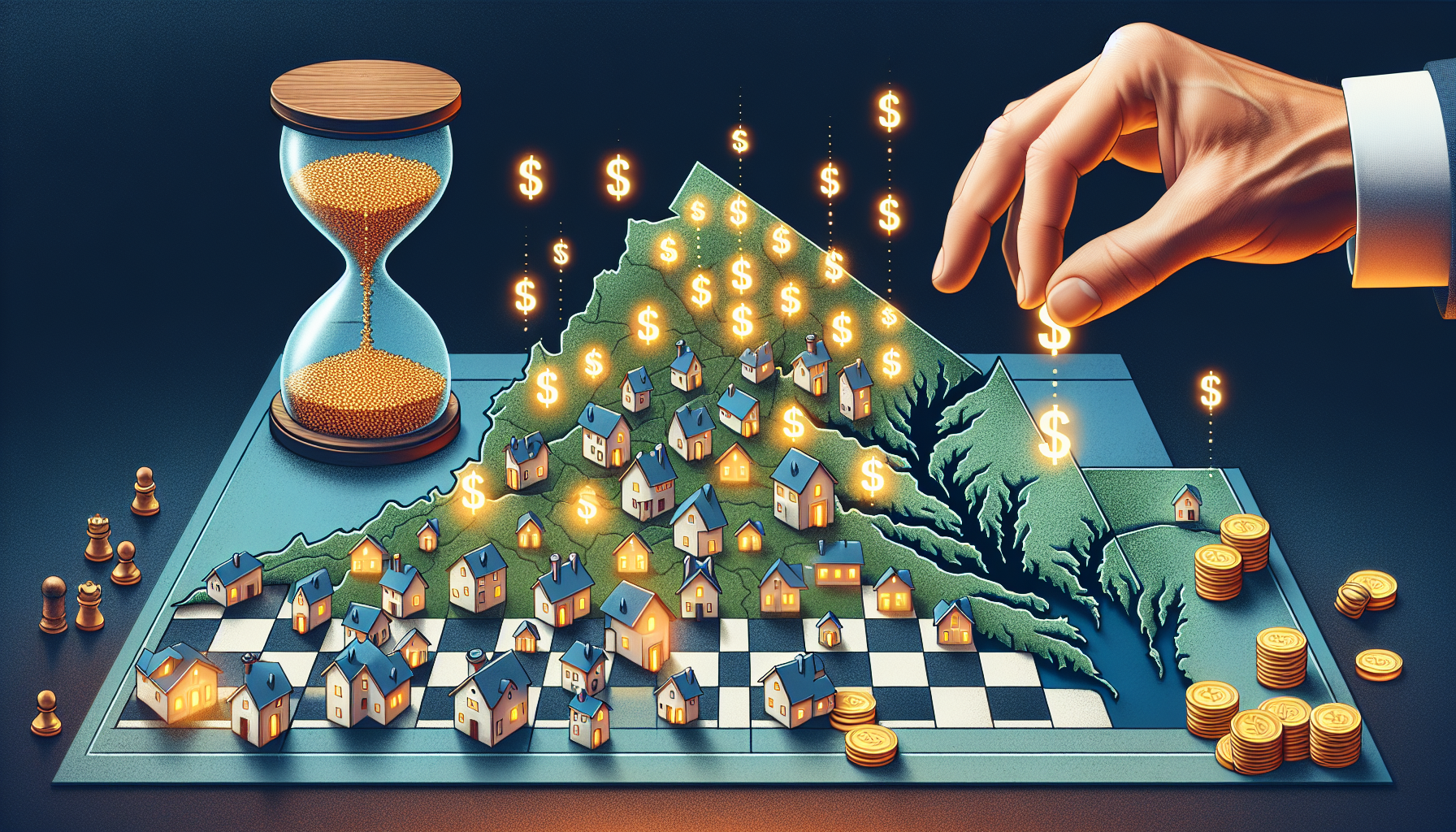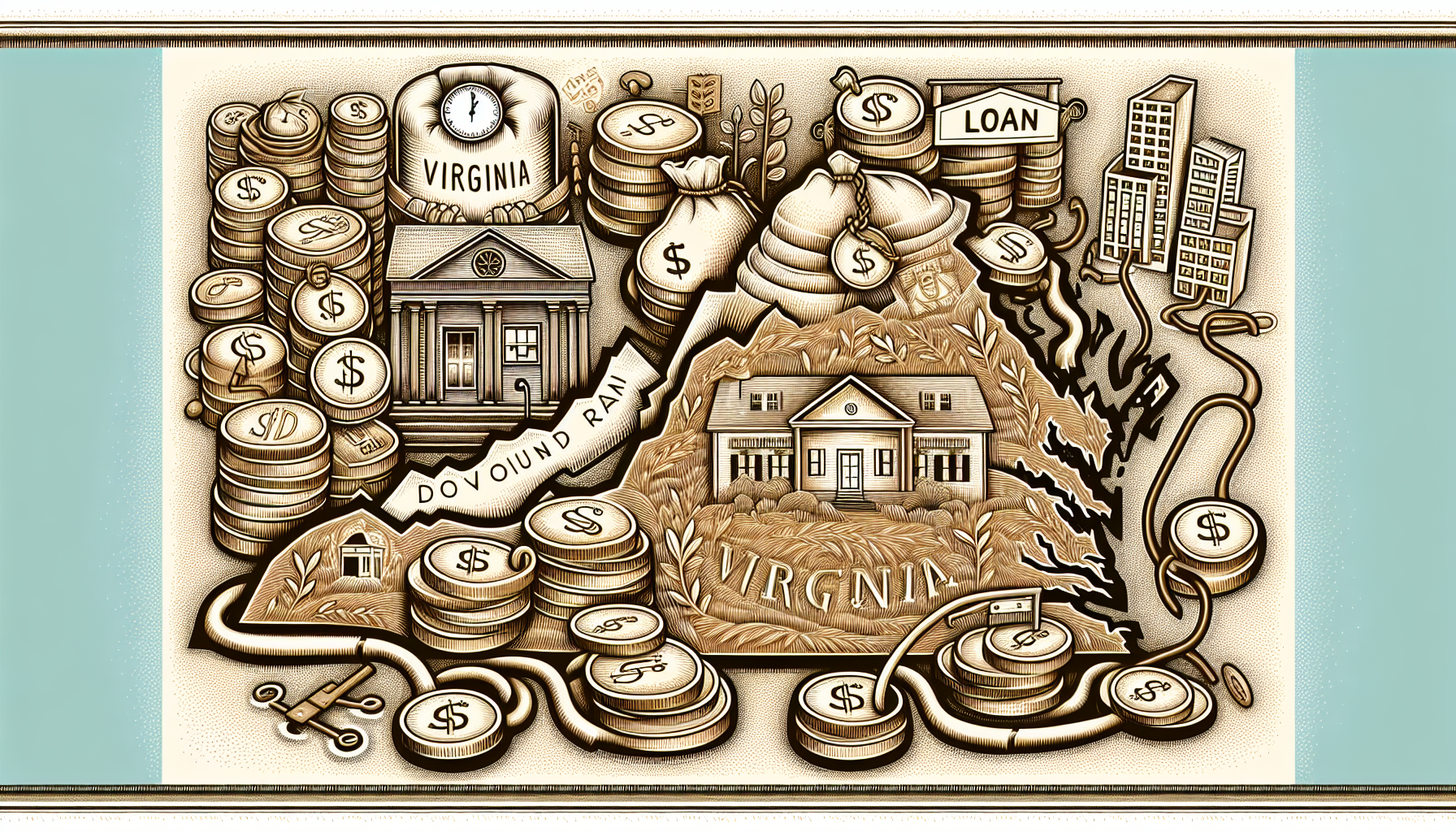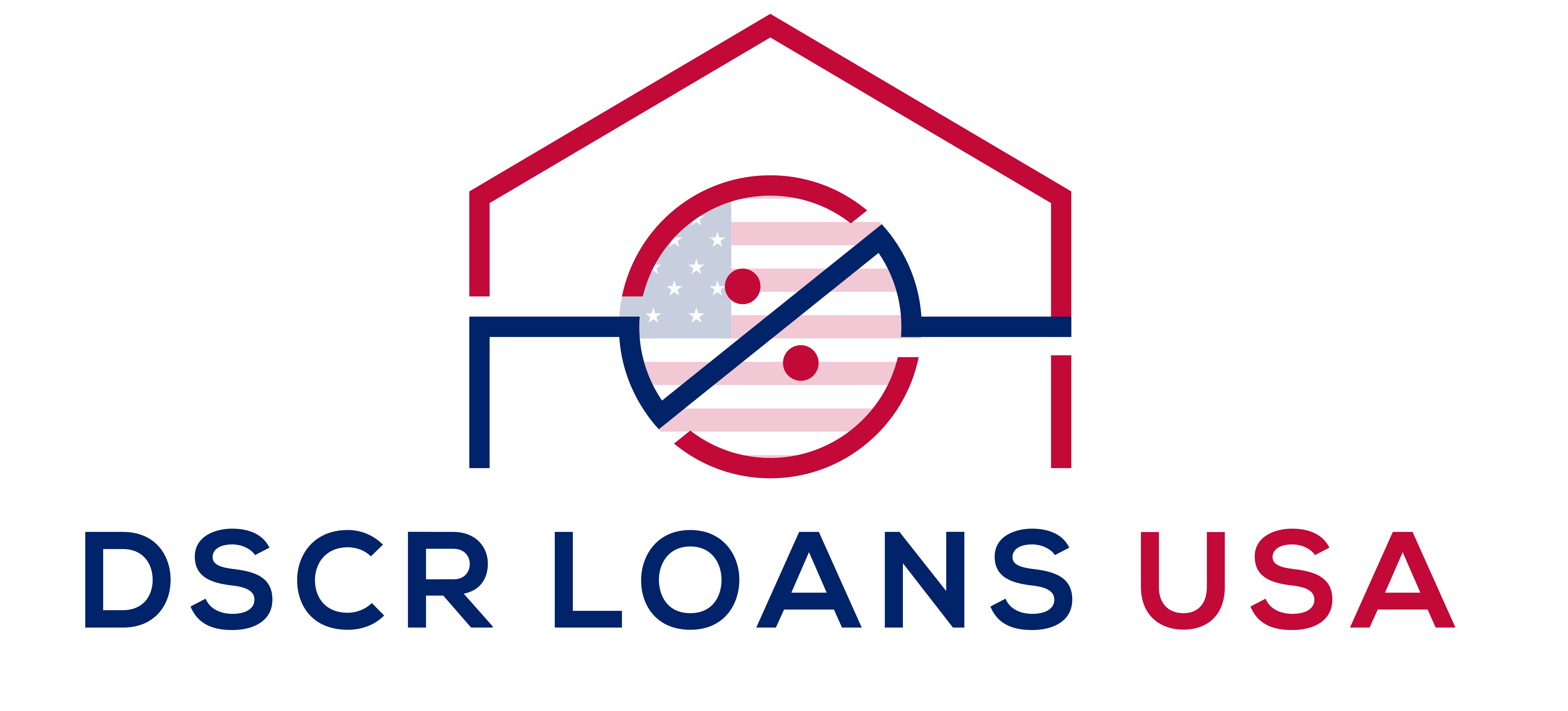Unlock the Potential: How to Get DSCR Loan Virginia for Property Investment Success
Seeking a DSCR loan in Virginia for your next property investment?
This no-fluff guide directly addresses how to get DSCR loan Virginia-wide, demystifying the eligibility requirements, procedures, and key considerations, geared specifically towards Virginia’s diverse real estate market.
Stay tuned for a clear path on “how to get dscr loan Virginia” and financing your rental properties in a state ripe with opportunity.
Key Takeaways
- DSCR loans in Virginia offer financing based on property rental income without requiring conventional income verification, featuring interest rates around 7.5% and stemming from a thriving Virginia rental market.
- Eligibility for a DSCR loan in Virginia requires a minimum FICO score of 660, a 20% down payment, and a registered business entity—the borrower’s business—while the property involved must be at a non-rural location with a minimum appraised value of $100,000.
- Obtaining a DSCR loan in Virginia involves finding a suitable lender, submitting an application with a favorable DSCR, and ensuring property and business entity criteria are met for successful closure and funding of the loan.
Understanding DSCR Loans in Virginia

DSCR loans have emerged as a revolutionary financing solution for rental properties in the Virginia real estate market. These loans enable investors to obtain financing based on the property’s rental income, circumventing the conventional income verification processes. This shift has led to an increasing number of borrowers turning to DSCR loans. In fact, a report from S&P Global revealed that approximately half of the 201,000 Non-Qualified Mortgage (Non-QM) loans rated between 2018 and February 2023 were DSCR loans.
The unique perks of DSCR loans, such as financing multiple rental properties irrespective of the investor’s personal debts, are driving their increasing demand. Besides, DSCR loans offer competitive interest rates, starting at around 7.5%, making them an attractive choice for many real estate investors in Virginia.
What is a DSCR Loan?
A DSCR loan, at its core, is a mortgage specifically designed for rental properties. Unlike traditional mortgages, the maximum loan amount for a DSCR loan isn’t dependent on the borrower’s personal income or employment history. Instead, it’s determined by the Debt Service Coverage Ratio (DSCR) of the property in question.
In simple terms, the DSCR is the ratio of the property’s annual net operating income to its annual debt service. This ratio serves as an indicator of the property’s ability to generate enough income to cover its debt obligations. As such, the rental income from the investment property plays a pivotal role in deciding the DSCR and ultimately impacts loan approval in Virginia.
Virginia Rental Market Landscape
With an average property price exceeding the US average at $372,943, Virginia presents a strong market for long-term rental investment opportunities. Additionally, Virginia’s rental rates rank as the 21st highest among all states in the United States, adding to its attractiveness for investors utilizing DSCR loans.
Cities like Richmond, Norfolk, Virginia Beach, Leesburg, and Lynchburg are top spots for rental property investments in Virginia. This popularity is due to their rapid population and employment growth coupled with rising home values. Among these cities, Lynchburg stands out as the premier city for property investment in Virginia. Factors such as a growing population, increasing employment opportunities, accessible rent, and rapid property turnover make Lynchburg exceptionally appealing for real estate investors.
The thriving rental market landscape in Virginia highlights the enormous potential for rental property investment, positioning DSCR loans as an effective financing solution to exploit this potential.
Qualifying for a DSCR Loan in Virginia

Eligibility for a DSCR loan in Virginia is determined by specific criteria. Notably, these loans do not require personal income verification, making the approval process more accessible and streamlined. For borrowers to qualify, they need to have a minimum FICO score of 660. In addition, they must be able to make a 20% down payment..
Moreover, to be considered for a DSCR loan in Virginia, the borrower’s business must meet the following criteria:
- It must be a registered LLC or corporation, as DSCR loans are strictly business-purpose loans.
- The property must have a minimum appraised value of $100,000.
- The property must not be located in a rural area.
Credit Score Requirements
The credit score is a crucial factor in determining the eligibility for a DSCR loan in Virginia. To qualify, borrowers need to have a minimum FICO score of 660. This requirement is important for assessing their creditworthiness. However, certain lending programs, such as Easy Street Capital’s EasyBuild program, require a higher minimum credit score of 680.
While the minimum required score is 660, having a score of 620 may still be acceptable, though a higher score can lead to better loan terms and interest rates. When borrowers form a borrowing entity, the credit score used to qualify for a Virginia DSCR loan is determined by the ownership percentages of each member.
Business Entity Status
To obtain a DSCR loan in Virginia, the borrower must be registered as a business entity. Specifically, DSCR loans are only available to business entities, not to individual borrowers. This requirement aligns with the fact that these loans are strictly for business purposes.
More importantly, investing in properties under a Limited Liability Company (LLC) can provide personal asset protection for the borrower and may allow them to avoid reporting the loan on personal credit reports. Given these benefits, an LLC is typically the recommended business entity structure for borrowers looking to secure a DSCR loan.
Property Appraisal and Non-Rural Location
Property appraisal and location play a significant role in the loan approval process. An appraisal is conducted to assess the market value and rental income potential of the property. This assessment is crucial for determining DSCR loan eligibility. Investors in Virginia can use DSCR loans for a variety of properties, including single-family residences and multifamily properties up to 10 units.
In addition to the property’s value and income potential, its location is also a critical factor. Specifically, the property must not be labeled as rural on the appraisal report to qualify for a DSCR loan in the Virginia market. This requirement aligns with the targeted nature of these loans towards properties with high rental income potential in urban and suburban areas.
Steps to Secure a DSCR Loan in Virginia

Obtaining a dscr loan virginia requires following a sequence of steps. The procedure commences with the investor submitting the required information for eligibility assessment. These details include the investor’s credit score, business entity status, and information about the property for which the loan is sought.
Following this, the investor must:
- Find a suitable mortgage broker or asset-based lender.
- The lender then assesses the provided information, conducts a property appraisal, and determines the loan terms based on the property’s DSCR.
- Once the terms are agreed upon, the investor can proceed to close the deal and receive the funds.
Finding the Right Mortgage Broker or Asset-Based Lender
Identifying a suitable lender is a significant step towards obtaining a DSCR loan. Investors should prioritize lenders that offer DSCR loans with no minimum DSCR requirement to ensure maximum flexibility in loan structuring. For instance, Easy Street Capital provides a range of loan options, including Hard Money and DSCR Loans, catering to the diverse needs of real estate investors in Virginia.
Furthermore, investors should compare interest rates offered by different lenders. With current DSCR loan interest rates being around 7.5% in Virginia, securing competitive terms can make a significant difference to the overall cost of the loan.
Preparing and Submitting Your Application
Following the selection of an appropriate lender, the investor should proceed with the preparation and submission of the loan application. Investors must ensure that they meet the lender’s minimum Debt Service Coverage Ratio (DSCR) requirements to be considered for a DSCR loan in Virginia. To calculate the DSCR, lenders evaluate the lower of actual rental income as per lease agreements or the income appraised value, adding up payments for principal, interest, taxes, insurance, and any homeowner association fees.
It’s noteworthy that vacant properties are also eligible for rental loans. In such cases, projected cash flows are determined by the appraised market rent. For instance, Easy Street Capital specifically uses appraised market rent values to determine the potential rental income for vacant Virginia properties.
Closing the Deal and Receiving Funds
Closing a DSCR loan deal in Virginia involves meeting certain requirements and completing specific tasks. For instance, DSCR loans in Virginia offer benefits that can affect the closing process, including a streamlined approval process, no limit on the number of financed properties, and the potential to take out loans under an LLC.
For DSCR loans, Virginia lenders may provide up to 80% financing of the property’s value or purchase price, impacting the amount required at closing. Before the DSCR loan can be funded, any property titled in a personal name in Virginia must be transferred to an LLC or corporation.
Strategies for Maximizing Your DSCR Loan in Virginia

Strategic approaches are required to fully exploit the potential advantages of a DSCR loan. These strategies include identifying high-potential rental properties, effectively managing the investment portfolio, and leveraging DSCR loans for refinancing and equity extraction.
By implementing these strategies, investors can optimize their investment returns, enhance their cash flow, and ensure efficient loan management. These strategies not only contribute to the growth of the investment portfolio but also offer financial security to the investors.
Identifying High-Potential Rental Properties
Identifying high-potential rental properties is a critical step for rental property investors in optimizing the benefits of a DSCR loan. Investors should consider various types of rental properties and evaluate their locations carefully to ensure strong market rent potential.
Additionally, the potential for growth in the property’s value and rental income should be factored into the selection of high-potential rental properties. However, investors must also be prepared for potential obstacles, such as market rental income falling short of projections, which can impact their ability to meet DSCR ratio requirements.
Managing Your Investment Portfolio
Effectively managing an investment portfolio is crucial for successful investment outcomes. Investors should set clear investment goals and objectives, which can guide decisions related to property acquisition and asset management. Furthermore, diversifying the investment portfolio by selecting and acquiring a varied set of properties across different types and locations can maximize returns and minimize risks.
Incorporating technology and analytics tools can also be instrumental in streamlining administrative tasks and supporting data-driven decision-making. Some benefits of using technology and analytics tools in property management include:
- Streamlining administrative tasks
- Supporting data-driven decision-making
- Ongoing monitoring and analysis of the portfolio to identify new opportunities and maximize returns
- Professional property management services providing support in handling daily operations
- Exploring refinancing or equity extraction options
These tools can help property managers save time, improve efficiency, and make more informed decisions.
Leveraging DSCR Loans for Refinancing and Equity Extraction
Refinancing with a DSCR loan can provide several benefits for property investors. These benefits include:
- The opportunity to secure lower interest rates and adjusted loan terms
- Access to the equity in their properties
- Added liquidity that can be reinvested in other high-potential rental properties, thereby expanding the investment portfolio.
Investors can utilize debt consolidation and refinancing strategies with DSCR loans to streamline their debt obligations, which can lead to improved cash flow for managing their investment portfolio. Lowered interest rates and an enhanced cash flow through strategic refinancing with a DSCR loan can contribute significantly to the efficient repayment of the loan.
Challenges and Considerations for Virginia DSCR Loans

Despite the many benefits of DSCR loans, they also present some challenges and considerations. For instance, a typical down payment requirement for DSCR loans in Virginia is 20%. Challenges may also arise if rental income projections do not meet expectations, impacting the DSCR ratio and loan eligibility.
Furthermore, for short-term or vacation rental properties, lenders use industry data projections to qualify the loan. However, investors must also be mindful of potential demand clauses in DSCR loans, which could enable lenders to require early repayment without a default event.
Down Payment Requirements
In Virginia, real estate investors seeking a DSCR loan usually need to provide a 20% down payment, which is a typical requirement for securing such loans. However, the down payment might be lower than 20%, depending on the borrower’s Debt Service Coverage Ratio.
Repeat borrowers with excellent financial histories might also be eligible for lower down payment requirements from DSCR lenders in Virginia through specific loan programs.
Maximum Loan Amounts and Higher Leverage
A DSCR loan in Virginia can cover loan amounts ranging from $150,000 to $3,000,000. These loans offer up to 80% loan-to-value on purchase or rate and term refinance and up to 75% loan-to-value on cash-out refinances. While these high loan-to-value ratios can be attractive to investors, they also pose risks due to the potential for higher leverage.
Short-Term Rentals and Regulatory Compliance
Short-term rental properties can face unpredictable demand due to seasonality, local events, and tourism fluctuations. Moreover, increased investment activity in popular tourist locations can lead to market saturation for short-term rentals. Therefore, investors must comply with specific local regulations that govern short-term rentals, which may include obtaining permits, paying transient occupancy taxes, or adhering to zoning laws.
Summary
DSCR loans offer a unique and attractive financing solution for real estate investors in Virginia, enabling them to leverage rental income potential instead of personal income. These loans are gaining popularity due to their flexible qualification process and competitive terms. However, like any financing option, DSCR loans come with their own set of challenges and considerations, including down payment requirements and regulatory compliance for short-term rentals.
Despite these challenges, with careful planning and strategic decisions, investors can maximize the benefits of DSCR loans and achieve property investment success. Whether you’re looking to expand your rental portfolio or refinance existing properties, DSCR loans could be the key to unlocking your property investment potential in Virginia.
Frequently Asked Questions
What is a DSCR loan?
A DSCR loan is a mortgage tailored for rental properties, with the maximum loan amount based on the property’s Debt Service Coverage Ratio (DSCR). It’s specifically designed for assessing the income and expenses of rental properties.
What are the requirements to qualify for a DSCR loan in Virginia?
To qualify for a DSCR loan in Virginia, you need a minimum FICO score of 660, your business must be a registered LLC or corporation, and the property must have a minimum appraised value of $100,000 and must not be located in a rural area. Good luck with your application!
How can I maximize the benefits of a DSCR loan?
To maximize the benefits of a DSCR loan, focus on identifying high-potential rental properties, effectively managing your investment portfolio, and leveraging the loan for refinancing and equity extraction. This will help you make the most of the loan and grow your investments.
What are the challenges associated with DSCR loans?
The challenges associated with DSCR loans include a 20% down payment requirement, unpredictable rental income projections impacting the DSCR ratio, and potential demand clauses for early repayment. These factors make DSCR loans complex and require careful consideration.
Can I use a DSCR loan for short-term rental properties?
Yes, you can use a DSCR loan for short-term rental properties, but it is essential to comply with local regulations and obtain necessary permits. Meeting industry data projections is also crucial for qualifying the loan.
Ready for More Great Tips and Information? Join Our Email List Today!

